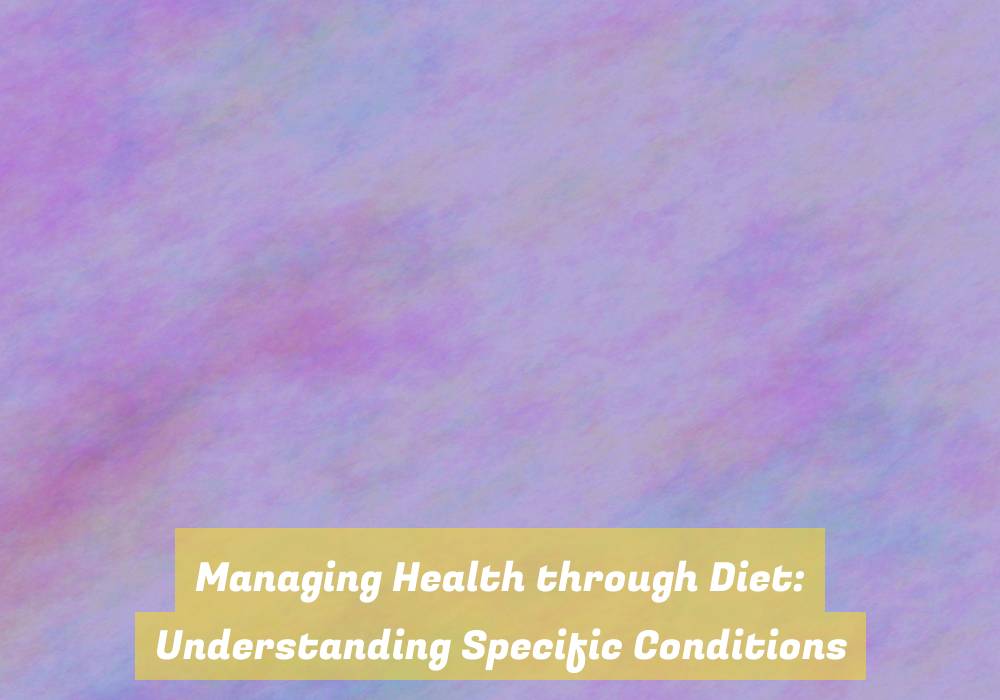Managing Health through Diet: Understanding Specific Conditions
Did you know that approximately 34.2 million Americans have diabetes? Understanding how to manage this condition through diet is crucial for maintaining overall health.
But itG??s not just diabetes that can be managed through diet; heart health, food allergies, and digestive issues also greatly benefit from dietary interventions.
Knowing how to navigate these specific conditions through nutrition can significantly impact your well-being.
LetG??s explore the power of food in managing these conditions and how you can take control of your health through simple dietary adjustments.
Diabetes and Diet
If you have diabetes, managing your diet is crucial to controlling your blood sugar levels and overall health. Paying close attention to the types and amounts of carbohydrates you consume is essential. Carbohydrates have the most significant impact on your blood sugar levels, so itG??s important to monitor your intake.
Choosing whole grains, fruits, vegetables, and legumes over refined grains and sugars can help regulate your blood sugar. Additionally, including lean proteins such as poultry, fish, and tofu in your meals can help stabilize blood sugar levels. ItG??s also important to limit your intake of saturated and trans fats, as they can increase the risk of heart disease, a common complication of diabetes.
Monitoring your portion sizes and spacing out your meals evenly throughout the day can also help manage blood sugar levels. Working with a registered dietitian can provide you with personalized guidance on how to best manage your diet to control your diabetes.
Heart Health and Nutrition
Managing your diet is essential for controlling your blood sugar levels and overall health, and it also plays a vital role in maintaining a healthy heart. When it comes to heart health, itG??s crucial to focus on consuming nutrient-dense foods that support cardiovascular function. A diet rich in fruits, vegetables, whole grains, lean proteins, and healthy fats can help lower the risk of heart disease. Additionally, reducing the intake of processed foods, sugary beverages, and saturated fats can contribute to better heart health.
Incorporating foods high in omega-3 fatty acids, such as salmon, flaxseeds, and walnuts, can also benefit your heart by reducing inflammation and lowering the risk of heart disease. Limiting sodium intake is equally important for managing healthy blood pressure levels. Choosing fresh, whole foods over processed options can help reduce sodium consumption.
Furthermore, being mindful of portion sizes and balancing your calorie intake with physical activity is key to maintaining a healthy weight, which is closely linked to heart health. Lastly, staying hydrated and minimizing alcohol consumption are additional factors to consider for overall heart health. By making informed dietary choices, you can actively support your heart health and reduce the risk of cardiovascular complications.
Dietary Management of Food Allergies
When dealing with food allergies, adjusting your dietary choices is crucial for managing symptoms and promoting overall health and well-being. The first step in managing food allergies is to identify and avoid the specific food or foods that trigger your allergic reactions. This requires careful reading of food labels and being mindful of cross-contamination in restaurants and food preparation areas. ItG??s essential to communicate your food allergies clearly to those who handle your food, whether itG??s at a restaurant or a social gathering.
In addition to avoiding allergens, itG??s important to ensure that your diet remains balanced and provides all the necessary nutrients. This may involve finding suitable substitutes for the allergenic foods to maintain a well-rounded diet. Consulting a registered dietitian can be immensely helpful in creating a meal plan that meets your nutritional needs while avoiding allergens.
Moreover, staying informed about food recalls and being proactive in asking about ingredients when dining out can help prevent accidental exposure to allergens. Remember, managing food allergies through dietary adjustments requires diligence and awareness, but itG??s crucial for your health and well-being.
Nutrition for Digestive Health
To promote digestive health, focus on incorporating fiber-rich foods into your diet. Fiber helps maintain regular bowel movements, prevents constipation, and supports a healthy gut. Include fruits like apples, pears, and berries, as well as vegetables such as broccoli, carrots, and Brussels sprouts. Whole grains like oats, quinoa, and brown rice are also excellent sources of fiber.
Additionally, probiotics play a crucial role in digestive health by promoting the growth of beneficial gut bacteria. Yogurt, kefir, and fermented foods like sauerkraut and kimchi are rich in probiotics and can aid in maintaining a healthy digestive system.
Moreover, staying hydrated is essential for proper digestion. Water helps break down food, absorb nutrients, and move waste through the digestive tract. Aim to drink at least 8-10 cups of water per day, and even more if youG??re physically active or live in a hot climate.
Lastly, limit your intake of processed and high-fat foods, as these can contribute to digestive issues. By focusing on fiber-rich foods, probiotics, hydration, and a balanced diet, you can support your digestive health and overall well-being.
Conclusion
So, now you have a better understanding of how diet can manage specific health conditions. Remember, making small but impactful changes to your diet can have a big impact on your overall health.
Whether itG??s managing diabetes, improving heart health, managing food allergies, or supporting digestive health, the right nutrition is key.
Take control of your health through the power of food and make the necessary changes to live your best life.





It’s so important to highlight the role of diet in managing diabetes and other health conditions. I’ve personally found that making mindful choices about carbohydrates has transformed my energy levels and overall well-being. When I switched to whole grains and increased my intake of fruits and vegetables, I not only noticed improvements in my blood sugar management but also in my mood and focus throughout the day.
It’s inspiring to hear how mindful choices about carbohydrates have made such a positive impact on your energy and overall well-being. Whole grains and more fruits and veggies can really change the game when it comes to managing blood sugar levels. It’s interesting how something as simple as changing your diet can have ripple effects on mood and focus too.
It’s encouraging to hear how shifting to whole grains and more fruits and vegetables has positively impacted your energy and blood sugar management. That kind of mindful approach to food can really make a difference. It’s fascinating how our bodies respond to the quality of what we eat—not just in physical health but even in our mood and clarity of thought.
It’s great to hear that you found the shift to whole grains, fruits, and vegetables compelling. It’s amazing how food choices affect not only our physical health but also how we feel mentally and emotionally. The connection between what we eat and our overall well-being is something that often gets overlooked, and it’s refreshing to have discussions around it.
It’s great to hear how mindful choices about carbohydrates have made such a difference for you. Whole grains, fruits, and vegetables pack a punch not just in nutrients but also in how they affect our bodies and moods. When we prioritize these foods, we’re not just managing blood sugar; we’re giving ourselves a steadier energy supply and even clearing up mental fog.